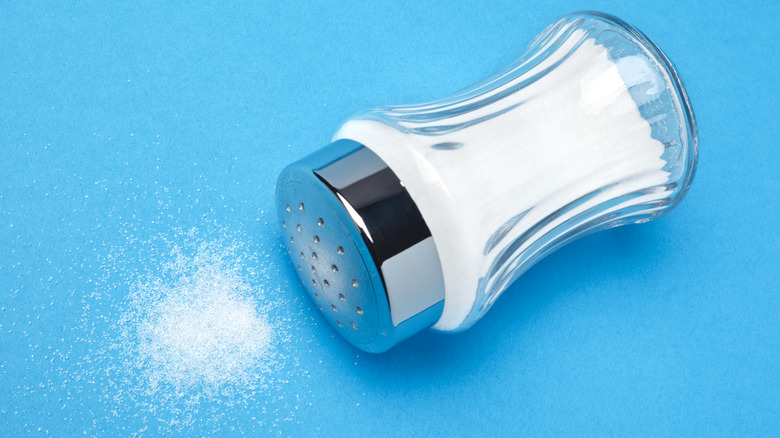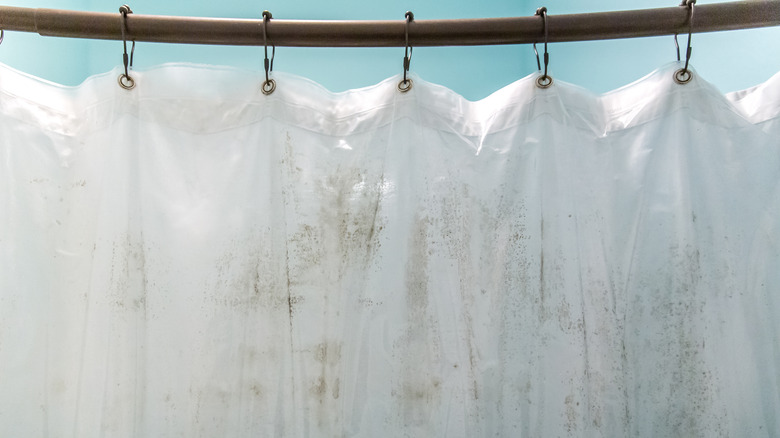Should You Be Washing Your Shower Curtain In Salt Water?
Whether it's after a sweaty workout or a dirty afternoon in the garden keeping worms away from your plants, nothing beats a long, hot shower to relax and refresh. Sadly, that luxurious reprieve can suddenly wash down the drain when you notice black mildew spots peppering your shower curtain. Realizing that nasty germs are infiltrating the very space you go to get clean can be unsettling. However, think twice before automatically ripping down and replacing your moldy curtain. A simple wash in salt water can return shower curtains to their original unsoiled glory while protecting them from future fungus attacks.
A bathroom's hot and humid environment provides the perfect conditions for mildew to grow and thrive. Consequently, it's not unusual to find spores spotting a shower curtain, regardless of whether it is made of plastic or fabric. In fact, the latter can harbor microscopic mold in its fibers long before visible growth is apparent. Typically, the first hint that mold has made a home in your cotton or natural fiber-based shower curtain is its musty smell.
If the odor is not enough to gross you out, consider the findings of a SafeHome study that found the average bathroom shower curtain harbors 60 times more bacteria than a toilet seat. To keep mildew from taking over your shower curtain and potentially creating a health risk for you and your family, forget about the chemical-based commercial cleaners and opt for an eco-friendly solution –- salt water.
Why and how to wash shower curtains in salt water
Who knew salt could be a secret weapon in the war against mold? Thank science. Salt, also known as sodium chloride, is a chemical compound whose antibacterial properties kill germs via osmosis. In the bathroom, salt eradicates germs from shower curtains by dehydrating mold spores. Since bacteria can't survive in the presence of high amounts of salt, washing your shower curtain in salt water is an effective way to naturally kill festering fungus.
Whether you are trying to eliminate mold currently covering your shower curtain or you just bought a new one and want to proactively safeguard it from mildew, start the salt water washing process by filling up your bathtub. Run warm water in the tub until it is at least 3 inches deep. Next, add in 2 cups of table salt and thoroughly mix until all of the salt is dissolved, then carefully place your shower curtain in the tub. It's important to fully saturate the entire curtain paying special attention to the bottom, where mildew tends to concentrate given its proximity to water exposure in the shower. Use your hands to weigh down the shower curtain as it initially begins to absorb water. Soak the curtain for a few hours before draining the tub. Once the tub is empty, gently squeeze out any excess water from the fabric curtains before hanging it up to dry. Plastic versions can drip dry after attaching them to the shower curtain rod.
Other natural shower curtain cleaners
To get ahead of mold growth, aim to wash shower curtains in salt water once a month. In between the salt soaks, you can spot treat mildew marks with a DIY cleaning solution made from vinegar. In addition to being environmentally-friendly, the spray can easily be applied without having to remove the shower curtain from its rod. Start by mixing together one part vinegar and four parts of water in a spray bottle and liberally saturating any mold stains. Mildew-free areas of the shower curtain can also be treated with the vinegar solution to prevent bacteria growth. Focus on the side of the shower curtain that faces the interior of the tub and allow the spray to sit for a few minutes before rinsing it with warm water.
Another cleaning option uses hydrogen peroxide to kill mold on shower curtains. Simply add two parts of hydrogen peroxide to one part water in a spray bottle and give it a good shake. Next, generously douse mildew spots with the disinfectant and allow it to sit for about 10 minutes before rinsing. If you notice mold marks remain after thoroughly rinsing the shower curtain, apply a paste made from baking soda and water to the stains and lightly scrub until the stains lift. Finish by closing the shower curtain all the way so it does not feature any folds, rinse it from top to bottom, and let it drip dry.


